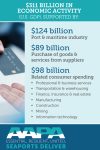Institutional Credibility in a Time of New Scrutiny
 The port industry serves as a critical cog in the economies of the Western Hemisphere, while maintaining a comparatively low profile in the public’s imagination. In recent years, however, port officials say that has changed.
The port industry serves as a critical cog in the economies of the Western Hemisphere, while maintaining a comparatively low profile in the public’s imagination. In recent years, however, port officials say that has changed.
* By Tom Gresham *
For decades, the port industry has served as a critical cog in the economies of the Western Hemisphere, while maintaining a comparatively low profile in the public’s imagination. In recent years, however, port officials say that has changed. As international trade has taken an increasingly prominent place in geopolitical debates, the role of the ports has been thrust into the spotlight. The result for the industry is new challenges – and new opportunities.
“In years past, I don’t know if people paid a whole lot of attention to ports,” says Alex Strogen, chief commercial officer for the Port of Vancouver USA. “It’s an exciting time to be a part of a port authority because of that, but these are also probably some of the most challenging times ports have had.”
Strogen and other port officials say the new scrutiny on ports offers an opening for officials to raise awareness of the far-reaching benefits that ports provide. However, the heightened attention also puts added pressure on port operators to engage effectively with stakeholders of all kinds, ranging from shippers and stevedores to community activists and local businesses.
Despite their essential role in the economy, Mario Cordero, executive director of the Port of Long Beach, says ports struggle to underline their importance to the wider public, partly because most people do not have personal experience with ports – in contrast to airports. The debates over international trade and the need for better national infrastructure planning and investment raises the stakes for ports to overcome misperceptions, he says.
“The big challenge we’re going to continue to have is making sure that the American public understands the benefits of ports to this country,” Cordero says.
Judith Adams, vice president of marketing for the Alabama State Port Authority, says an individual port’s reputation has critical ties to its success. Ultimately, Adams says, “Good community relations is good for business.”
“If shippers have options, they are not inclined to ship through port terminals that suffer the effects of poor community and public support,” Adams says. “Business likes pro-business communities. Businesses are more and more interested in your pro-community and environmental track record.”


